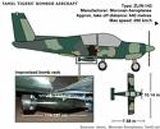 The nightmare scenario sometimes conjured to push for further regulation of general aviation aircraft in the U.S. played out in Sri Lanka Friday and ended with one aircraft crashing into a government building and the other close to an air force camp. Used as weapons of war by rebel forces, two men flew two 1600-pound Zlin Z-143 light piston single aircraft at night using handheld GPS and “torch light” (presumably flashlights) to guide them in an effort to deliver themselves and about 280 pounds of C4 high explosive to their targets. Sources differ in their reports regarding of the amount of explosives carried — some cite 215 kg, or close to 473 pounds. The aircraft’s maximum gross weight is roughly 3,000 pounds. According to rebel sources, the men were not meant to return from what they called suicide missions and they were not shot down. Rebels claim the two defense installation targets were hit and both the military and rebel accounts seem to agree that one aircraft struck the Inland Revenue Department building and exploded. The other aircraft crashed into a marsh, according to the Sri Lankan air force, which said both aircraft were turned away from other targets by a darkened city (defensive blackout) and ground fire. The two pilots were killed and more than 40 people were injured in the attacks. The extent of damage to the building was not reported. The local government claims each aircraft had engaged after the aircraft were spotted on radar and said their destruction, plus that of another aircraft destroyed in September, leave the rebels without any remaining air power.
The nightmare scenario sometimes conjured to push for further regulation of general aviation aircraft in the U.S. played out in Sri Lanka Friday and ended with one aircraft crashing into a government building and the other close to an air force camp. Used as weapons of war by rebel forces, two men flew two 1600-pound Zlin Z-143 light piston single aircraft at night using handheld GPS and “torch light” (presumably flashlights) to guide them in an effort to deliver themselves and about 280 pounds of C4 high explosive to their targets. Sources differ in their reports regarding of the amount of explosives carried — some cite 215 kg, or close to 473 pounds. The aircraft’s maximum gross weight is roughly 3,000 pounds. According to rebel sources, the men were not meant to return from what they called suicide missions and they were not shot down. Rebels claim the two defense installation targets were hit and both the military and rebel accounts seem to agree that one aircraft struck the Inland Revenue Department building and exploded. The other aircraft crashed into a marsh, according to the Sri Lankan air force, which said both aircraft were turned away from other targets by a darkened city (defensive blackout) and ground fire. The two pilots were killed and more than 40 people were injured in the attacks. The extent of damage to the building was not reported. The local government claims each aircraft had engaged after the aircraft were spotted on radar and said their destruction, plus that of another aircraft destroyed in September, leave the rebels without any remaining air power.
Reports indicate that the attacks may have been intended for other targets and the pilots altered their plans after being diverted from their original targets of an air force facility and power station by anti-aircraft fire. The Sri Lankan military claims the attacks show the rebels are desperate and now, without air power, weak. The rebels claim the attacks were successful air raids and that both pilots were decorated veterans of the Liberation Tigers of Tamil Eelam (LTTE).


































